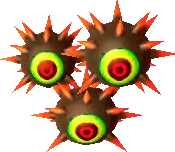Swarm of Morths (5e Creature)
Swarm of Morths
|
Large swarm of Tiny monstrosities, unaligned Armor Class 10 (natural armor)
Damage Resistances bludgeoning, piercing, slashing Aggressive. As a bonus action, the swarm can move up to its speed toward a hostile creature that it can see. Forest Camouflage. The swarm has advantage on Dexterity (Stealth) checks made to hide in forests, woodlands, or other terrain of abundant foliage. Reactive. The swarm can take a reaction on every creature's turn in combat. Swarm. The swarm can occupy another creature's space and vice versa, and the swarm can move through any opening large enough for a Tiny monstrosity. The swarm can't regain hit points or gain temporary hit points. Other creatures treat the space this swarm occupies as difficult terrain. Swarm Tactics. The swarm has advantage on an attack roll against a creature if it is within 5 feet of that creature. ACTIONSCling. Melee Weapon Attack. +0 to hit, reach 0 ft., one creature. Hit: On a critical hit only, the creature takes 1 piercing damage. On any hit, one morth from the swarm "clings" and becomes physically attached to the target. While the morth is clung to the target, the target's attack rolls have disadvantage against this morth, and the target's speed is halved. Multiple clung morths can further halve the target's speed (reducing it to one quarter, one eighth, and so on), but cannot reduce the target's speed below 5 feet. A morth can no longer cling if it takes any damage, or moves away from the target. Any number of clung creatures are removed if the target creature takes an action to remove them.
|
 Source See Morth (5e Creature). A morth appears as a black sphere with numerous protruding orange barbs, and a single large eye with a green iris and a crimson pupil. It is only about the size of a gerbil, and is only capable of moving with erratic hops. Despite its dangerous appearance the creature's barbs are intended to cling to the hide of other creatures, much like a burr, rather than to stab and inflict damage. Weaponized Offspring. Morths are usually spawned by mothula in swarms. Like living weapons, morths cling to the mothula's potential prey to make them easier to hunt, and cling to predators to make it more difficult to pursue the mothula parent. These tendencies persist even in the absence of any mothula. Although they lack a unified mind or direction, a swarm of morths reacts in a manner so unified that they appear to be acting as a single cohesive mind. |
See also
- Morth
- Mothula, the parent of this larval creature
- Gel, a similar Tiny creature which only attacks by slowing down larger creatures
Back to Main Page → 5e Homebrew → 5e Creatures
Back to Main Page → 5e Homebrew → Campaign Settings → Hyrule→ Bestiary → Mothula

